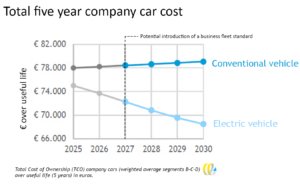From 2025 onward, electric cars will almost always be more economical for employers than fossil cars. CE Delft research, commissioned by the Dutch Association for Sustainable Energy (NVDE), shows this. ‘Choosing electric cars saves the employers money’ says Olof van der Gaag, NVDE chairman.
Lower employer costs.
Electric driving is increasingly less expensive than driving a conventional car. This is especially the case for company cars that drive more kilometres and therefor benefit more from the electric car’s greater efficiency. From 2025, an electric car’s Total Cost of Ownership (TCO) will, in many cases, be more favourable. This will certainly apply from 2027 when electric driving will be more beneficial for the average company car in segments B to E. This includes 94 percent of company cars, according to CE Delft.
The image below shows the average benefit for all company cars calculated over five years. The lifespan is of course much longer, especially for EV’s. The coalition parties want to (rightly so) implement a weight correction for electric vehicles regarding the motor vehicle tax (MRB). This is not yet included and makes for an even more favourable financial picture.
Company support
To Arno Veenman, HR policy advisor at the Volksbank, it comes as no surprise that electric driving is cheaper rather than more expensive. ‘At the Volksbank one hundred percent electric has already been mandatory since 2017. We started from the perspective of a CO₂-reduction target, but it then also proved to be very financially attractive. In 2024, leasing an EV is three percent cheaper compared to a conventional car and even thirty percent cheaper when it comes to charging. The lessee will also be better off over a sixty-month period, as long as a discount on the fiscal surcharge percentage for private use is in place. Costs are therefore not a limiting factor in switching to an electric lease fleet.’
Opportunity for companies
The NVDE hopes that many more employers will take this opportunity to save costs and reduce their mobility emissions. The government can support this development by introducing a fleet standard:
A fleet standard means that all new company cars must be emission-free, i.e. electric or hydrogen. This saves costs, reduces fossil fuel imports and lowers the mobility CO₂-emissions in the Netherlands. If the standard is introduced in 2027, the electric company car share will rise from 57 percent to 66 percent in 2030. This achieves a yearly CO₂-reduction of 0.7 Mton in 2030 which equals around five percent of all car emissions in the Netherlands. It does not yet consider the positive effects from the flow to the second-hand market. A fleet standard benefits a serious second-hand market, making electric cars more quickly accessible to everyone. A few years ago, the NVDE, together with a coalition of dozens of large companies, already advocated for the introduction of a fleet standard.
Fiscal surcharge advantage ensures lower costs to employees
Until 2030, the purchase price of EV’s is normally slightly higher. As a result, employees pay a higher fiscal surcharge on an electric car than on a comparable conventional car. The reduced surcharge percentages for electric cars will expire from 2026. This tax raise for electric drivers increases the costs for some of the employees.
‘Electric driving is better for the quality or air and the climate and should therefore never be more expensive than conventional driving,’ says Van der Gaag. ‘A reduced surcharge comes at no cost to the treasury because electric cars are still more expensive, and the charge is partly based on that.’ Read the summary of the CE Delft research here: ‘Zero-emission fleet standard company cars; Research into employer and employee costs’.

